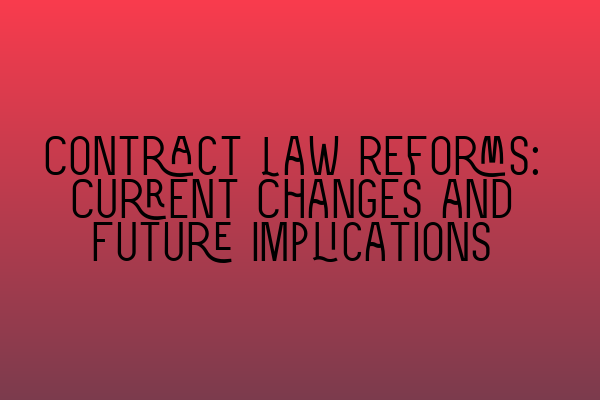Contract Law Reforms: Current Changes and Future Implications
Contract law is a fundamental aspect of any legal system, providing the framework for individuals and businesses to enter into agreements and ensure that those agreements are enforceable. Over time, contract law has evolved to keep pace with societal and economic changes, and recently, there have been several notable reforms that are poised to have a significant impact on the legal landscape. In this blog post, we will explore the current changes in contract law and discuss their future implications.
1. The Online Contracts Revolution
In the digital age, online contracts have become ubiquitous. From online shopping to software licensing agreements, almost every aspect of our lives is now governed by electronic contracts. Recognizing the need for clarity and consumer protection in this rapidly evolving area, lawmakers have introduced reforms to address issues such as the validity of electronic signatures, the enforceability of terms and conditions, and the protection of consumer rights. These reforms aim to strike a balance between facilitating e-commerce and safeguarding consumer interests.
For a comprehensive guide on forming a Limited Liability Company (LLC) in the UK, check out our article: LLC Formation Made Simple: Step-by-Step Guide for UK Entrepreneurs.
2. Balancing Fairness and Freedom of Contract
Contract law has traditionally valued the principle of freedom of contract, allowing parties to negotiate and agree on the terms of their contracts as they see fit. However, concerns have been raised about the potential for power imbalances and unfair terms in contracts, particularly in consumer and employment contracts. As a result, there has been a push for greater regulation and protection for vulnerable parties. Reforms have been introduced to strengthen consumer rights, limit unfair contract terms, and enhance transparency in contract negotiations.
If you’re interested in learning more about business regulations in the UK, read our comprehensive overview: Business Regulations in the UK: A Comprehensive Overview.
3. Embracing Technology: Smart Contracts and Blockchain
As technology advances, so too does the potential for innovative solutions in contract law. Smart contracts, powered by blockchain technology, offer the promise of automated, self-executing agreements with increased efficiency and security. These contracts are programmed to automatically fulfill their terms once predetermined conditions are met, eliminating the need for traditional intermediaries. While smart contracts are still in their early stages of development, they present exciting possibilities for simplifying complex transactions and reducing transaction costs.
To accelerate your exam preparation for the SQE, consider attending our workshops and webinars: SQE Workshops and Webinars: Accelerate Your Exam Preparation.
4. The Global Perspective: Cross-border Contracting
In an increasingly interconnected world, cross-border transactions have become commonplace. However, navigating the complexities of cross-border contracts can be challenging. To address these challenges, legal professionals are leveraging cross-border legal services to ensure compliance with various jurisdictions and mitigate international risks. Understanding the key insights and practices of Delaware Corporate Law is particularly essential for UK solicitors dealing with international business transactions.
For key insights into Delaware Corporate Law relevant to UK solicitors, check out our article: Delaware Corporate Law for UK Solicitors: Key Insights and Practices.
Conclusion
The current changes in contract law reflect the evolving needs of our modern society. From the rise of online contracts to the integration of blockchain technology, these reforms seek to strike a balance between promoting efficiency and safeguarding the rights and interests of individuals and businesses. As the legal landscape continues to evolve, staying informed and adaptable will be crucial for legal professionals to navigate the complex world of contracts.
To learn more about leveraging cross-border legal services strategically, read our comprehensive guide: Leveraging Cross-border Legal Services: A Strategic Guide.
